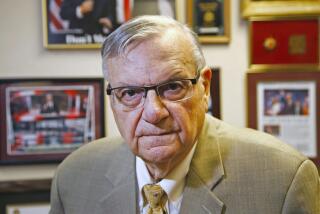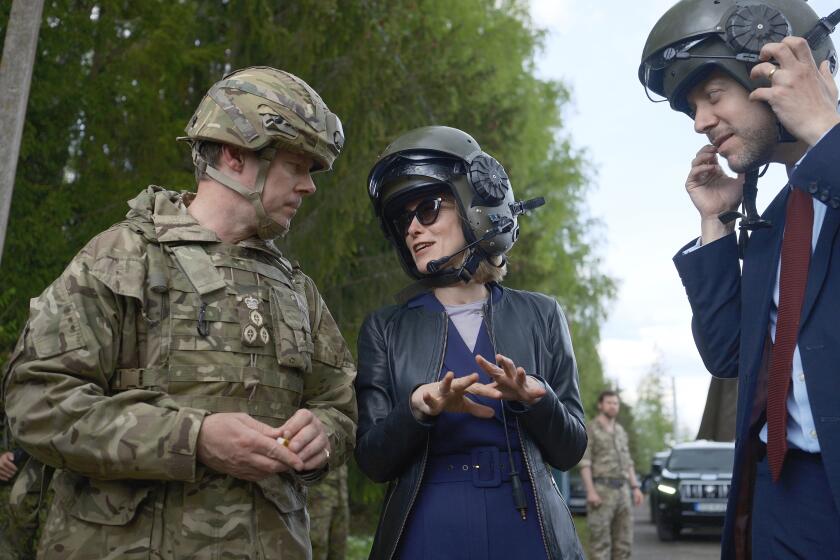N.Y. Suspect May Face Jet Bombing Plot Trial First : Courts: Judge cites fairness. He says co-defendant shouldn’t have to wait for Ramzi Yousef to be prosecuted for trade center blast.
A federal judge on Monday told Ramzi Ahmed Yousef, the alleged mastermind of the 1993 bombing of the World Trade Center, that he was considering trying him first on charges of plotting to blow up U.S. airliners in the Far East--which could result in the death penalty if Yousef is convicted.
A trial on the airliner plot would be far shorter than the trade center case, which resulted in months of painstaking testimony and a jury conviction of four defendants last year. Judge Kevin Duffy sentenced the terrorists to 240 years each in prison for their attack on the trade center that resulted in six deaths and more than 1,000 injuries.
Eleven days ago, prosecutors broadened their indictment of Yousef beyond the trade center to include plotting to destroy airliners and charging him with exploding a bomb aboard a Philippine Airlines plane bound for Tokyo last December that killed a Japanese passenger.
Also indicted with Yousef was Abdul Hakim Murad, who shared an apartment in Manila that government investigators allege was turned into a bomb factory. Murad was not charged in the trade center terrorism.
Both defendants appeared at a hearing Monday before Duffy, who acknowledged that Murad was not linked to the twin towers explosion. But, the judge said, the government was alleging he was “up to his ears” in the plane plot.
Prosecutors said it would take three weeks until evidence in the plane plot could be turned over to defense attorneys.
“I don’t know the twists and turns this case will take,” Duffy said, adding that he was considering “trying it in two lumps.”
Duffy said it was unfair for Murad to wait until completion of all the trade center evidence before the charges against him were considered by a jury. He noted that appeals by the four defendants convicted last year were still pending, which could further lengthen the time before a second trade center trial could begin.
If convicted in the airliner plot, Yousef faces a maximum sentence of life in prison or the death penalty. Murad faces a maximum sentence of 45 years in prison.
Government lawyers have not announced whether the death penalty will be sought against Yousef, who was captured in Pakistan and returned to the United States in February. Murad was arrested in the Philippines and brought to New York on April 13--the day a more detailed indictment against Yousef was unsealed.
Roy R. Kulcsar, the lawyer appointed by the court to defend Yousef, said that during the trip back to the United States from Pakistan, his client had made statements and that agents escorting the prisoner had taken notes of what was said.
Duffy ordered these notes turned over to the defense counsel before setting another hearing date for May 26 to consider possible pretrial motions.
Outside the courtroom, Kulcsar told reporters that Yousef was being kept under 24-hour guard in an isolation cell at the Metropolitan Correctional Center next to the federal courthouse in Manhattan, but was allowed to subscribe to newspapers and to listen to a radio provided by the prison.
He said that Yousef had no contact with inmates at the facility, including Sheik Omar Abdel-Rahman and 10 other defendants currently being tried for plotting a war of domestic terrorism by planning to blow up two tunnels linking New York and New Jersey, the United Nations and the Manhattan headquarters of the FBI. Government lawyers contend the bomb plots and the attack on the trade center are related.
Kulcsar said he expected that Yousef, even if found guilty of planning to attack airliners and planting a bomb aboard one plane, still would be tried for his alleged role in the trade center attack.
More to Read
Start your day right
Sign up for Essential California for news, features and recommendations from the L.A. Times and beyond in your inbox six days a week.
You may occasionally receive promotional content from the Los Angeles Times.






